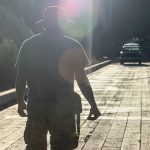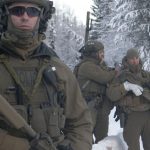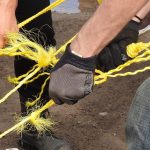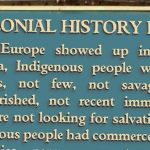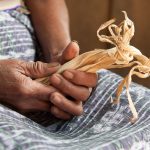When a Reporter Stops Asking Questions (Q&A)
Trevor Jang is a Vancouver-based journalist who, last year, was assigned to travel across northern British Columbia and listen to its residents: a somewhat foreign and uncomfortable experience in a profession whose dominant role is to ask questions. Descended from Chinese and Wet’suwet’en First Nation heritage, Jang’s own cultural background and deep roots in the province’s northern region added layers of complexity and emotion to his task. In a Q&A withCulturally Modified editor Amanda Follett Hosgood, Jang shares his thoughts on the mainstream media’s approach to culture and his experience bearing witness to the issues and challenges facing the north. Jang wrote about his experience for Vancouver’s Discourse Media
CM: Tell me about where you were raised and your own cultural background. How did it contribute to you wanting to become a journalist?
I grew up in the Vancouver area. I’m very much a city kid. But when I was 15 my mother moved us up to Smithers, in northern British Columbia. She is Wet’suwet’en, from Witset (Moricetown), and it was always her intention to return home. Moving to Smithers was a culture shock and at the time I hated it. I experienced racism for being part Chinese and had a hard time fitting in. But looking back now, my mom was planting a seed. That seed eventually grew into an urge to explore my Wet’suwet’en identity as an adult.
That exploration is where journalism comes in. I’ve always loved writing and storytelling, as far back as I can remember. But when I started exploring my Indigenous culture and history through writing, at first with short stories, something inside me shifted. A light went off. Eventually my knack for storytelling led to a radio broadcasting career and then long-form journalism, which I’ve focused almost exclusively on Indigenous issues and communities in British Columbia. But it all started with exploring my own culture through creative writing.
CM: What sparked your interest in touring northern BC and just listening? When did your trip happen and what communities did you visit?
That wasn’t my idea. It was a task assigned to me by the folks at Discourse Media. They were looking to get a better understanding of the issues people in northern BC care about and what stories they would like to see covered. I was like, So you just want me to go up there and listen to people? And they were like, Yeah, pretty much.
Rather than go with a pre-assigned story to write — based on a story idea emanating from Discourse — the plan was to not write a story necessarily, but to just listen. So that’s what I did. I travelled from Prince Rupert to Smithers over two and a half weeks last November just to chit chat.
CM: You describe the assignment as “strange and uncomfortable.” What made it so?
It was strange and uncomfortable in comparison to a reporting trip, which has very clear deliverables: get the story. But on this assignment there was no story in the traditional sense. Me meeting people was the story.
CM: Describe the people you met with: Their cultural differences? Their concerns? What did they want to talk about?
My trip’s theme wasn’t completely random and open ended. It occurred after Discourse had spent some time reporting on the potential of a liquefied natural gas industry in the north. So most of the people I met with wanted to talk about resource development. Some were pro-LNG. Some were against LNG.
The highlight for me had to be bringing Shannon McPhail and Lucy Sager-Praught together for a cup of coffee. Shannon runs the Skeena Watershed Conservation Coalition and was fiercely opposed to the Pacific Northwest LNG project, which was the hot-button issue at the time. Lucy was a vocal supporter of the project. The two were butting heads in the Facebook group that I had created for the trip, which was a space for community members to discuss these issues.
But when the three of us got together over coffee, Shannon and Lucy completely hit it off. They realized they had a lot more in common than they thought. They agreed to disagree on the LNG project, but decided to look for ways to work together. I really had nothing to do with it at that point. I was just sitting there sipping my coffee and watching two “enemies” become new allies. Last time I checked in with them they were still working together.
CM: How are mainstream media letting down the communities you visited? Who is being left out of the current media discourse?
The issues in the north are complex. They require a lot of time to understand, and a lot of words to explain. The issues are often too complex for a short news story, but that’s all they usually get from mainstream outlets in the big markets. There’s not a lot of money in Canadian journalism, so there’s usually a lack of resources to get to the north and do the deep reporting that you need to do to unpack the complexity.
I often see quotes from chiefs or mayors or vocal activists, but not the everyday people on the ground who don’t seek out the spotlight. Those are the people who often have the most to say and most interesting stories to tell.
CM: You talk about wanting to include people in the story development process by “opening up our editorial process in a somewhat uncomfortable way.” How unbalanced is the current flow of communication between media generators and media consumers? What would collaborative journalism look like?
Someone once told me that journalism is an “extractive industry” in the same way that the resource sector is. Except instead of taking resources that can be assigned monetary value, what journalism extracts from communities is intangible: people’s opinions, beliefs, fears and hopes for the future. People pour their hearts out to journalists sometimes. That’s naturally a power imbalance.
Journalists need to make sure we do communities justice in return and give some of that power back. This can be done by allowing community members to help shape our reporting in a much more meaningful way than just asking for a quick quote. It’s about building a relationship based on trust. It’s not easy or simple though. It’s a constantly evolving learning experience for both journalists and community members alike.
CM: Do media need to tailor their reporting for different cultures? Or can they effectively communicate with a diversity of people in a common way? Did you feel you engaged differently with different people you encountered?
One of the huge and continuing issues in Canadian journalism is the lack of diversity in newsrooms. Given my own ancestry and lived experience, I am going to approach stories about Indigenous issues, for instance, very differently than someone who isn’t Indigenous.
That doesn’t mean different cultures can only be observed and reported on from within the culture, but nor is there a “melting pot” of common stories. What’s exciting about some of the emerging voices in Indigenous journalism in particular is the different story forms that disrupt old ways of doing journalism.
CM: You talk about “building deeper community reporting” and continuing to engage with a story after it’s been published. Why is that important, particularly in the communities you visited? How has it been lost within our current media model?
Where trust has been lost in journalism is the lack of engagement with communities, as budgets have been slashed and reporters just churn out content and move onto the next story. Discourse wants to engage before we even select what stories to write, because there is so much knowledge and expertise in communities that’s a form of trapped energy we want to release through our reporting.
Also, stories have consequences, and we want to stay engaged through the life of a story to understand how it is being received and what impacts it is having. And we want to stay with subjects for the long haul. Yes, a couple of big LNG projects have been cancelled, and there is a lot to learn about why, and what comes next. One thing came very clear over the past year or so, which is that communities want to have a say in development that affects them. Our journalism is just one way that can happen.
CM: In your piece, you describe meeting a long-lost cousin who is homeless and the emotional impact it had on you. How does reporting on a region in which you have deep roots change your approach? Does it make the task more difficult, more important, both?
Both, for sure. I never planned on reporting in the north. That’s just the way it’s worked out. But I’m grateful that it has worked out that way because I’ve gotten to know so many interesting and inspiring people from the region, and I’ve gotten to know people I thought I knew a little better. Having deep ancestral and cultural ties to the north makes it all the more special, but also difficult.
When you’re Wet’suwet’en, people sometimes expect a certain perspective from you. But as a journalist you have to be neutral and balanced in your reporting. I don’t say objective because I don’t believe there’s such a thing as objective reporting. But you have to look at it from all worldviews, not just the one you come from.
Meeting my long-lost cousin who was homeless was hard. It’s not something that happens to journalists very often, but unfortunately it is something that happens to Indigenous people more commonly than non-Indigenous people. As Discourse reporter Wawmeesh Hamilton says: “I’m a journalist who happens to be Indigenous.” Sometimes the latter makes the former more difficult.
Trevor Jang is a writer based in Vancouver. His investigative journalism focused on Indigenous issues and communities has appeared in Discourse Media, B.C. Business magazine, CBC Indigenous, Reveal from the Centre for Investigative Reporting and the National Observer. Trevor was a recipient of the 2016 CBC Indigenous Fellowship through the Canadian Journalism Foundation and a chosen participant of the 2017 Literary Journalism Residency at the Banff Centre for Arts and Creativity. He is a mix of Chinese-Canadian and Wet'suwet'en Nation descent. See more of his work at www.trevorjang.com.
